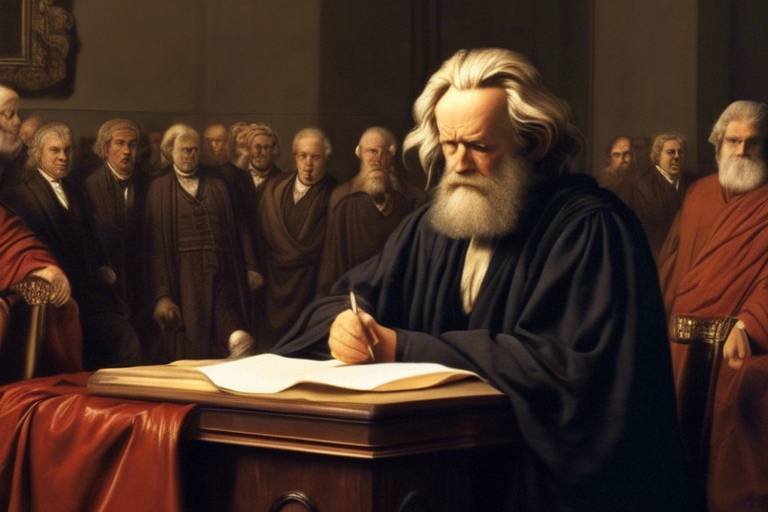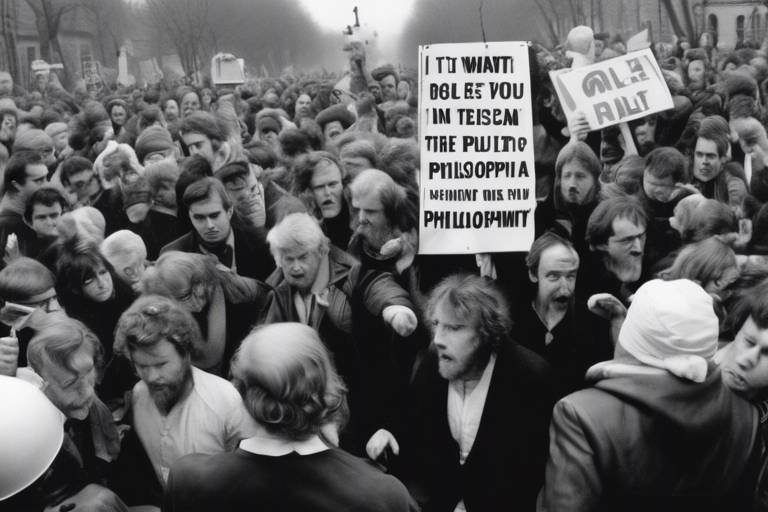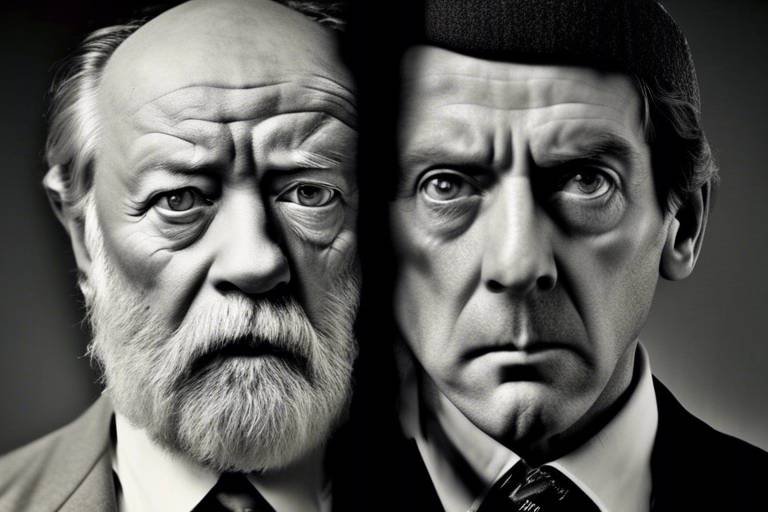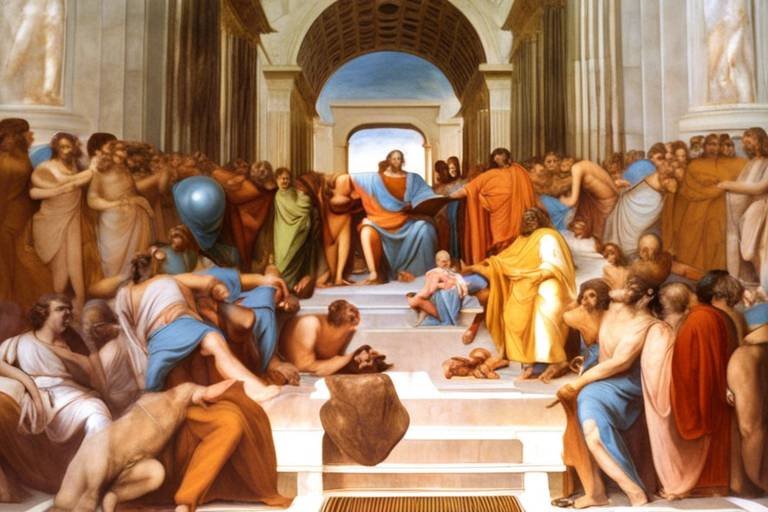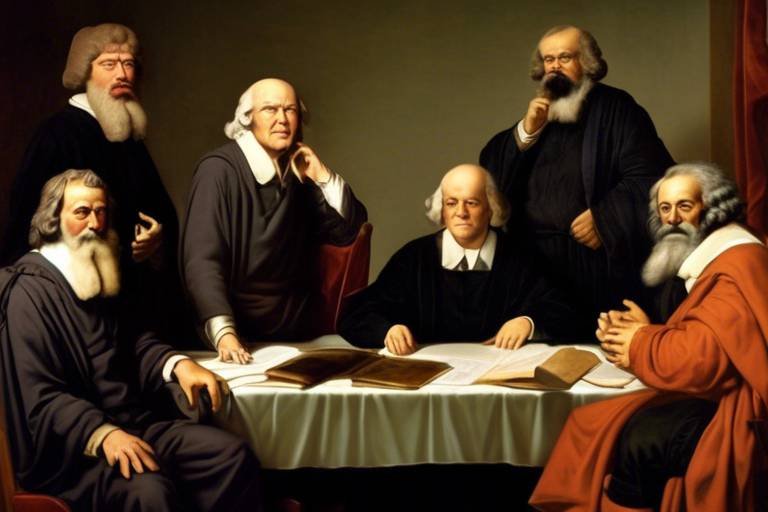Philosophy - An Essential Component of Political Science?
When we think about political science, it’s easy to get lost in the sea of policies, elections, and governance. But what lies beneath these surface-level concepts is a rich tapestry woven from philosophical thought. Philosophy acts as the compass guiding political theorists through the complex waters of power, justice, and authority. Without this philosophical foundation, our understanding of politics would be like trying to navigate a ship without a map—confusing and directionless.
At its core, philosophy pushes us to ask the big questions: What is justice? Who holds power, and why? How should a society be organized? These questions are not just academic; they are vital for anyone interested in the functioning of their government and society. When political scientists engage with these philosophical inquiries, they gain the ability to critically analyze various political systems and ideologies. It’s like having a magnifying glass that reveals the intricate details of political dynamics that are often overlooked.
Consider how philosophical principles influence the very fabric of political ideologies. For instance, the concept of human rights is deeply rooted in Enlightenment philosophy. Thinkers like John Locke argued for the inherent rights of individuals, laying the groundwork for modern democratic thought. Without such philosophical underpinnings, political ideologies such as liberalism, conservatism, and socialism would lack the depth and rationale that make them compelling.
Moreover, the relationship between philosophy and political science is not static; it evolves as society changes. New challenges arise, prompting fresh philosophical inquiries that can reshape political landscapes. For example, the rise of digital technology and social media has sparked debates around privacy, freedom of speech, and the role of government in regulating these new frontiers. As political scientists grapple with these issues, they must turn to philosophy to find ethical frameworks and theoretical models that can guide their analyses.
In essence, philosophy is not just an abstract discipline; it is a vital tool that enriches our understanding of political science. It provides the analytical framework necessary for examining the legitimacy of political authority, the nature of justice, and the moral implications of policy decisions. As we continue to explore the intricate relationship between these two fields, it becomes increasingly clear that philosophy is not merely an accessory to political science—it is an essential component that shapes our understanding of governance and societal structures.
- How does philosophy influence political ideologies?
Philosophy provides the foundational principles that shape political ideologies, allowing for a deeper understanding of concepts like justice and power. - Why is philosophical inquiry important in political science?
Philosophical inquiry encourages critical thinking and helps political scientists address complex issues in governance and ethics. - Can political philosophy adapt to modern challenges?
Yes, political philosophy evolves to address contemporary issues, such as technology's impact on privacy and governance.

The Role of Philosophy in Political Theory
Philosophy serves as the bedrock of political theory, providing a framework through which we can critically analyze the complex notions of power, justice, and authority. It’s not just a collection of abstract ideas; rather, it’s a lens through which political scientists can scrutinize the very fabric of society and governance. By delving into philosophical principles, we uncover the underlying motivations and ethical considerations that shape political ideologies and practices. This exploration is akin to peeling back the layers of an onion, revealing the core beliefs that drive political actions and policies.
At its essence, philosophy encourages us to ask the fundamental questions: What is justice? Who holds power, and why? How should authority be exercised? These inquiries are vital as they help us understand the theoretical underpinnings of various political systems, from democracies to autocracies. For example, when we think about justice, we often reflect on the works of philosophers like John Rawls, who proposed the idea of a "veil of ignorance" to ensure fairness in societal structures. This philosophical approach allows political theorists to develop frameworks that are not only theoretical but also applicable in real-world governance.
Furthermore, philosophy aids in the critique of existing political systems. By employing philosophical reasoning, political scientists can evaluate the effectiveness and legitimacy of governance models. This critical analysis often leads to the identification of flaws within these systems, prompting discussions about necessary reforms. For instance, consider the philosophical debates surrounding liberalism and conservatism. Each ideology is rooted in distinct philosophical traditions that inform their views on the role of the state, individual rights, and societal obligations.
To illustrate this point, let’s consider how philosophy intersects with political ideologies:
| Political Ideology | Philosophical Foundation | Key Concepts |
|---|---|---|
| Liberalism | John Locke, John Stuart Mill | Individual rights, freedom, equality |
| Conservatism | Edmund Burke | Tradition, social order, gradual change |
| Socialism | Karl Marx | Collective ownership, class struggle, equality |
As we can see, each political ideology is deeply rooted in philosophical thought, which informs its principles and policies. By understanding these philosophical origins, we can better grasp the implications they have for society and governance. Philosophy not only enriches political theory but also fosters a deeper understanding of the ethical dimensions of political decisions.
In conclusion, the role of philosophy in political theory is indispensable. It equips political scientists with the tools to analyze, critique, and innovate within the realm of governance. As we navigate the complexities of modern political landscapes, the insights drawn from philosophical inquiry will continue to illuminate the path toward more just and effective political systems.
- What is the relationship between philosophy and political science?
Philosophy provides foundational concepts that inform political theories, allowing for critical analysis of power, justice, and authority. - How do philosophical ideas influence political ideologies?
Philosophical ideas shape the core principles of political ideologies, guiding their approaches to governance and societal organization. - Can philosophy help in critiquing political systems?
Yes, philosophical reasoning enables political scientists to evaluate and challenge existing political systems, encouraging reform and innovation.

Historical Perspectives on Political Philosophy
When we dive into the rich tapestry of political philosophy, we uncover a historical journey that has shaped modern governance and societal norms. Thinkers from different eras have contributed their unique perspectives, laying the groundwork for how we understand power, authority, and justice today. For instance, the ancient Greeks, particularly Plato and Aristotle, set the stage for political thought with their profound inquiries into the nature of the state and the role of citizens.
Plato, in his seminal work The Republic, envisioned a society governed by philosopher-kings, where wisdom and virtue would lead to a just state. His ideas spark discussions that resonate even in contemporary political debates, challenging us to consider what constitutes a fair and equitable society. On the other hand, Aristotle took a more empirical approach, advocating for the study of actual political systems. He believed that by examining various forms of government, we could derive principles that could improve governance. This empirical methodology is foundational in modern comparative politics, where scholars analyze different political structures to understand their dynamics and effectiveness.
As we move through history, we encounter the likes of Thomas Hobbes, whose work Leviathan introduced the concept of the social contract. Hobbes argued that in the absence of a strong central authority, life would be "solitary, poor, nasty, brutish, and short." His ideas about the necessity of a powerful sovereign to maintain order have influenced various political ideologies, especially those that prioritize security and stability over individual freedoms.
Fast forward to the Enlightenment, where philosophers like John Locke and Jean-Jacques Rousseau began to challenge Hobbes' views. Locke's emphasis on natural rights and the government's role in protecting these rights laid the foundation for liberalism, while Rousseau's notion of the "general will" introduced the concept of collective sovereignty. These contrasting ideas sparked debates that continue to shape our understanding of democracy and the rights of individuals versus the authority of the state.
In the 19th and 20th centuries, political philosophy further evolved with thinkers like Karl Marx, who critiqued capitalism and proposed a revolutionary approach to societal change. Marx's ideas about class struggle and the need for a proletarian revolution have inspired numerous movements worldwide, highlighting the ongoing relevance of philosophical discourse in addressing social inequalities.
To summarize, the historical perspectives on political philosophy reveal a dynamic interplay of ideas that have influenced political thought across centuries. From the idealism of Plato to the pragmatism of Aristotle, and the revolutionary ideas of Marx, each philosopher has contributed to a rich dialogue that continues to inform our understanding of governance today. The following table illustrates key philosophers and their contributions:
| Philosopher | Key Work | Main Contribution |
|---|---|---|
| Plato | The Republic | Philosopher-kings and justice |
| Aristotle | Politics | Empirical analysis of governments |
| Thomas Hobbes | Leviathan | Social contract and authority |
| John Locke | Two Treatises of Government | Natural rights and liberalism |
| Jean-Jacques Rousseau | The Social Contract | General will and democracy |
| Karl Marx | The Communist Manifesto | Critique of capitalism and class struggle |
As we reflect on these historical perspectives, it's clear that political philosophy serves as a vital lens through which we can examine and critique our current political systems. It encourages us to ask hard questions about justice, governance, and the role of the individual within society, ultimately pushing us toward a deeper understanding of what it means to live in a democratic society.
- What is the significance of political philosophy?
Political philosophy helps us understand the principles and ideas that underpin political systems, guiding our thoughts on governance and justice. - How have historical philosophers influenced modern politics?
Historical philosophers laid the groundwork for contemporary political ideologies, shaping our understanding of democracy, rights, and governance. - Why is it important to study different political systems?
Studying various political systems allows us to learn from their successes and failures, informing better governance practices.

Key Philosophers and Their Contributions
When we dive into the realm of political philosophy, we encounter a plethora of thinkers who have profoundly influenced our understanding of governance, power, and justice. These key philosophers have not only shaped political ideologies but have also provided frameworks that continue to inform contemporary political discourse. Let's take a closer look at some of these influential figures and their groundbreaking contributions.
Plato, often hailed as the father of Western philosophy, introduced the concept of the ideal state in his work, "The Republic." He proposed that society should be governed by philosopher-kings, individuals who possess both wisdom and virtue. Plato's vision emphasized the importance of justice and the role of education in creating a harmonious society. His ideas about the ideal forms and the nature of reality laid the groundwork for subsequent philosophical inquiry into governance and ethics.
Moving forward in history, we encounter Aristotle, Plato's student, who took a more empirical approach. Unlike his teacher, Aristotle believed in studying the actual political systems of his time. In "Politics," he categorized different forms of government and analyzed their strengths and weaknesses. His emphasis on observation and comparison established the foundation for what we now refer to as comparative politics. Aristotle's insights into human behavior and the role of the state remain relevant in modern political analysis.
Another significant figure is Thomas Hobbes, whose work "Leviathan" introduced the idea of the social contract. Hobbes argued that in a state of nature, human life would be "solitary, poor, nasty, brutish, and short." To escape this chaos, individuals consent to surrender some of their freedoms to a sovereign authority, ensuring peace and security. Hobbes' thoughts on authority and governance have sparked extensive debates about the balance between liberty and security in political systems.
In contrast, John Locke offered a more optimistic view of human nature. In his "Two Treatises of Government," Locke posited that individuals possess natural rights to life, liberty, and property. He argued that governments are formed to protect these rights and that citizens have the right to revolt against oppressive regimes. Locke's ideas on democracy and individual rights laid the foundation for modern liberal thought and significantly influenced the development of democratic institutions.
Lastly, we can't overlook the contributions of Karl Marx, who critiqued capitalism and proposed a revolutionary framework for understanding class struggle. In works like "The Communist Manifesto," Marx argued that history is driven by economic forces and class conflicts. His analysis of capitalism's inherent inequalities has led to the development of various socialist ideologies and continues to inspire political movements worldwide.
In summary, the contributions of these philosophers are not merely historical footnotes; they are the building blocks of political thought that resonate through the ages. Their ideas challenge us to question our political systems and consider the ethical implications of governance. As we navigate the complexities of modern politics, reflecting on these foundational theories can provide valuable insights into the challenges we face today.
- What is the significance of philosophy in political science?
Philosophy provides the foundational concepts that inform political theory, enabling critical analysis of power, justice, and authority. - How have historical philosophers influenced modern political thought?
Thinkers like Plato, Aristotle, Hobbes, Locke, and Marx have shaped contemporary political ideologies and frameworks, influencing governance and societal structures. - What role do ethical considerations play in political philosophy?
Ethics are central to political philosophy, impacting debates on governance, policy-making, and justice.

Plato's Ideal State
Plato's vision of an ideal state is not just a mere concept; it is a profound exploration of what governance should embody. In his seminal work, "The Republic," he introduces the idea of the philosopher-king, a ruler who possesses both wisdom and virtue. This notion suggests that those who govern should be the most knowledgeable and morally upright individuals in society. Imagine a world where leaders are not driven by self-interest but by a genuine desire to seek the common good! Plato believed that only such rulers could create a just society, thereby ensuring harmony and order.
In this ideal state, justice is paramount. Plato argues that justice is achieved when everyone performs their designated role within society, akin to the parts of a well-functioning organism. Just as the heart pumps blood to sustain the body, each class in Plato's state—rulers, warriors, and producers—has its unique function that contributes to the overall health of the community. This division of labor is not merely practical; it is a reflection of human nature, where individuals possess different skills and aptitudes. To illustrate this, consider the following table that summarizes the three classes in Plato's ideal state:
| Class | Role | Virtue |
|---|---|---|
| Rulers | Govern and make laws | Wisdom |
| Warriors | Protect the state | Courage |
| Producers | Provide goods and services | Moderation |
This model of governance raises significant questions about the nature of power and authority. Can a small group of enlightened individuals truly understand the needs of the many? Plato's ideal state suggests that those who have ascended to the realm of knowledge are best equipped to make decisions for the populace. However, this raises a paradox: how do we ensure that these philosopher-kings remain accountable and do not become tyrants? Plato's framework invites us to reflect on the delicate balance between authority and liberty, a theme that resonates through political philosophy to this day.
Moreover, Plato's ideal state is not static; it requires a rigorous educational system to cultivate future leaders. He advocates for a comprehensive education that nurtures both the mind and the soul, emphasizing the importance of philosophical training. This education is not just about acquiring knowledge but about developing the character necessary to lead wisely. In a way, Plato's vision can be seen as an early precursor to modern discussions on the importance of ethics in leadership and governance.
In conclusion, while Plato's ideal state may seem utopian, it serves as a crucial reference point for understanding the interplay between morality and politics. His ideas challenge us to consider the qualities we seek in our leaders and the kind of society we aspire to create. As we navigate the complexities of modern governance, Plato's insights remain relevant, urging us to strive for a political system that prioritizes justice, wisdom, and the common good.
- What is the concept of the philosopher-king?
The philosopher-king is a ruler who possesses both wisdom and virtue, ideal for governing a just society. - How does Plato define justice in his ideal state?
Justice is achieved when each class performs its designated role, contributing to the overall harmony of society. - Why is education important in Plato's ideal state?
Education is crucial for developing future leaders who are knowledgeable and morally sound, ensuring wise governance.

Aristotle's Empirical Approach
Aristotle, often hailed as the father of political science, took a distinctive empirical approach to understanding governance and political systems. Unlike his mentor Plato, who focused on ideal forms and abstract concepts, Aristotle believed in examining the world as it is. He advocated for observing actual governments rather than speculating about what an ideal state should look like. This shift from the theoretical to the practical not only laid the groundwork for modern political analysis but also emphasized the importance of real-world evidence in shaping political thought.
One of Aristotle's significant contributions was his classification of governments based on their structure and the number of rulers. He categorized them into three ideal forms: monarchy, aristocracy, and polity, and their corresponding corrupt forms: tyranny, oligarchy, and democracy. Through this lens, he argued that the best government is one that serves the common good, a concept that resonates with contemporary democratic ideals. Aristotle's empirical observations led him to emphasize the importance of context in political analysis, recognizing that the effectiveness of a government could vary depending on the society it governs.
Furthermore, Aristotle's work, particularly in his book Politics, is a treasure trove of insights into human behavior and social dynamics. He posited that humans are inherently social creatures, driven by a desire for community and belonging. This notion of sociality is crucial for understanding how political systems evolve and function. By studying various city-states, Aristotle was able to draw conclusions about the nature of governance, justice, and the role of citizens in political life. His empirical method encouraged future political scientists to adopt a similar approach, blending observation with theoretical inquiry.
To illustrate Aristotle's empirical approach, consider the following table that summarizes his classifications of government:
| Type of Government | Ideal Form | Corrupt Form |
|---|---|---|
| Rule by One | Monarchy | Tyranny |
| Rule by Few | Aristocracy | Oligarchy |
| Rule by Many | Polity | Democracy |
In conclusion, Aristotle's empirical approach has profoundly shaped the field of political science. By prioritizing observation and analysis over abstract theorizing, he laid the foundation for a more scientific study of politics. His insights into the nature of governance, the role of citizens, and the importance of context continue to influence political thought today. As we navigate the complexities of contemporary governance, Aristotle's legacy reminds us of the value of grounding our political theories in the realities of human experience.
- What is Aristotle's main contribution to political science? Aristotle's main contribution is his empirical approach to studying political systems, emphasizing observation and classification based on real-world governments.
- How does Aristotle differentiate between different types of government? He categorizes governments into ideal forms (monarchy, aristocracy, polity) and their corrupt counterparts (tyranny, oligarchy, democracy) based on who rules and for whose benefit.
- Why is Aristotle considered the father of political science? He is considered the father of political science due to his systematic analysis of political structures and his emphasis on empirical observation, which laid the groundwork for future political theories.

Modern Political Philosophy
Modern political philosophy is a vibrant field that addresses the complexities of contemporary governance, social justice, and individual rights. This branch of philosophy has evolved significantly, adapting to the rapidly changing political landscapes of the 21st century. Think about it: every time we turn on the news, we encounter debates about democracy, human rights, and the role of government in our lives. These discussions are not mere chatter; they are deeply rooted in philosophical inquiry that seeks to understand the principles that govern our societies.
At the heart of modern political philosophy lies a critical examination of existing political systems. Philosophers today are not just content to analyze historical ideologies; they actively critique and challenge the structures that govern us. For instance, contemporary thinkers like John Rawls and Robert Nozick have sparked extensive discussions on justice and the distribution of resources. Rawls' theory of justice as fairness proposes that a just society is one where inequalities are arranged to benefit the least advantaged, while Nozick’s libertarian approach emphasizes individual rights and minimal state intervention. This clash of ideas highlights the ongoing struggle between competing visions of justice and governance.
Moreover, modern political philosophy extends beyond theoretical discussions; it engages with pressing social issues. Topics such as climate change, globalization, and human rights are at the forefront of philosophical discourse. Philosophers are increasingly called upon to provide frameworks for understanding these complex issues. For instance, how do we balance individual freedoms with collective responsibilities in a world facing environmental crises? This question is not just philosophical; it has real-world implications that affect policy-making and societal norms.
In addition to addressing contemporary challenges, modern political philosophy also seeks to redefine concepts that have long been taken for granted. Take democracy, for example. Traditionally viewed as a straightforward system of governance, modern thinkers are exploring its nuances. What does it mean to be democratic in an age of misinformation and polarization? How can we ensure that all voices are heard in a society that often prioritizes the loudest over the most informed? These questions push us to rethink our understanding of democracy and its role in fostering a just society.
To illustrate the diverse perspectives within modern political philosophy, consider the following table that summarizes key thinkers and their contributions:
| Philosopher | Key Ideas |
|---|---|
| John Rawls | Theory of Justice, Original Position, Difference Principle |
| Robert Nozick | Libertarianism, Entitlement Theory, Minimal State |
| Martha Nussbaum | Capabilities Approach, Human Development, Social Justice |
| Jürgen Habermas | Public Sphere, Communicative Action, Deliberative Democracy |
As we move forward, the intersection of philosophy and political science will only grow more intricate. The challenges we face require not only practical solutions but also a deep understanding of the ethical implications of our choices. Modern political philosophy offers a rich tapestry of ideas that can guide us in navigating these complexities. By engaging with these philosophical perspectives, we can foster a more nuanced understanding of our political realities, ultimately leading to more informed and responsible governance.
- What is modern political philosophy? Modern political philosophy examines contemporary issues of governance, justice, and rights while critiquing existing political systems.
- Who are some key figures in modern political philosophy? Notable thinkers include John Rawls, Robert Nozick, Martha Nussbaum, and Jürgen Habermas, each contributing unique perspectives on justice and governance.
- How does modern political philosophy address social issues? It engages with pressing topics like climate change, globalization, and human rights, providing frameworks for understanding and addressing these challenges.
- Why is philosophy important in politics? Philosophy helps us critically analyze political systems, guiding ethical decision-making and fostering a deeper understanding of governance and societal norms.

Philosophy and Political Ideologies
Political ideologies are like the lenses through which we view the world of governance, society, and human interaction. At their core, these ideologies are deeply entwined with philosophical thought, serving as the backbone for various political movements and beliefs. Understanding the roots of these ideologies requires us to delve into the philosophical principles that underpin them. For instance, liberalism, conservatism, and socialism are not just political positions; they are reflections of broader philosophical ideas about human nature, society, and the role of the state.
Let's take a closer look at how these ideologies are influenced by philosophical thought:
- Liberalism: This ideology champions individual rights and freedoms, drawing heavily from the Enlightenment thinkers like John Locke, who argued for the protection of life, liberty, and property. The philosophical underpinnings of liberalism emphasize the importance of personal autonomy and the belief that individuals should have the freedom to pursue their own happiness, as long as they do not infringe on the rights of others.
- Conservatism: In contrast, conservatism often roots itself in the philosophy of tradition and social order. Thinkers like Edmund Burke emphasized the importance of societal structures and the wisdom embedded in historical practices. This ideology argues for the preservation of established institutions and values, believing that change should be gradual and cautious.
- Socialism: Socialism, on the other hand, is grounded in the philosophical critique of capitalism and inequality. Karl Marx's ideas about class struggle and the need for collective ownership of the means of production are central to this ideology. Philosophically, socialism raises questions about justice, equity, and the role of the state in ensuring that resources are distributed fairly among all members of society.
Each of these ideologies not only presents a distinct vision for society but also reflects deeper philosophical inquiries about what it means to live a good life. The debates among them often pivot on fundamental questions: What is justice? What rights should individuals possess? How should power be distributed? These questions are not merely academic; they have real-world implications that shape policies and governance structures.
Moreover, as our world becomes increasingly complex, the intersection between philosophy and political ideologies is more relevant than ever. Issues such as climate change, social justice movements, and technological advancements challenge traditional ideological frameworks, prompting a re-evaluation of their philosophical roots. In this evolving landscape, the ability to analyze and adapt these ideologies through a philosophical lens can lead to more effective governance and a more just society.
In conclusion, the relationship between philosophy and political ideologies is a dynamic and intricate one. By understanding the philosophical foundations of various ideologies, we can better navigate the complexities of political discourse and contribute to the ongoing evolution of our societal structures.
- What is the significance of philosophy in political ideologies? Philosophy provides the foundational principles that shape political ideologies, influencing how societies are governed and how power is distributed.
- How do different political ideologies approach social justice? Each ideology has its own perspective on social justice; for instance, socialism emphasizes equity and collective ownership, while liberalism focuses on individual rights.
- Can political ideologies change over time? Yes, political ideologies can evolve as society changes, often influenced by new philosophical insights and emerging social issues.

The Intersection of Ethics and Politics
When we talk about the intersection of ethics and politics, we’re diving into a fascinating realm where moral principles meet the gritty realities of governance. Think about it: every law, policy, and political decision is underpinned by ethical considerations. Whether it’s the debate over healthcare, climate change, or civil rights, the ethical implications are profound. So, how do we navigate this intricate relationship?
At its core, political philosophy asks us to ponder questions like: What is justice? Is it fair to prioritize certain groups over others in policy-making? And who gets to decide what is ethical? These questions challenge us to consider the moral fabric that holds our societies together. For instance, consider the ethical dilemma surrounding social justice. Advocates argue that society must actively work to correct historical injustices, while opponents may claim that such measures infringe on individual rights. This tug-of-war illustrates how ethics can shape political ideologies and influence policy decisions.
Moreover, ethical theories—such as utilitarianism, deontology, and virtue ethics—provide frameworks for evaluating political actions. Utilitarianism, which promotes actions that maximize happiness for the greatest number, can lead to policies that prioritize the majority's needs. In contrast, deontological ethics, which emphasizes duty and rules, might argue for the protection of minority rights, regardless of the majority's desires. This clash of ethical perspectives is not just academic; it plays out in real-world political debates and decisions.
To illustrate, let’s consider a recent political issue: the implementation of universal basic income (UBI). Supporters argue that UBI is an ethical response to economic inequality, providing a safety net for all citizens. Critics, however, question the morality of providing financial support without conditions, fearing it may discourage work and personal responsibility. This debate encapsulates the essence of ethics in politics, as it forces us to grapple with questions of fairness, responsibility, and the role of government.
In addition, ethical considerations are crucial in policy-making. Politicians often face dilemmas where the right choice is not necessarily the most popular one. For example, addressing climate change may require sacrificing short-term economic gains for long-term sustainability. Here, the ethical principle of stewardship for future generations comes into play, challenging policymakers to act in the best interest of not just their constituents, but the planet as a whole.
As we navigate these complex intersections, it becomes clear that ethics must not be an afterthought in political discourse. Instead, it should be a guiding principle, shaping our understanding of justice, rights, and responsibilities. By fostering a dialogue that integrates ethical considerations into political discussions, we can work towards a more equitable and just society.
- What is the role of ethics in political decision-making?
Ethics serves as a framework for evaluating the morality of political actions and policies, guiding leaders in making decisions that align with societal values. - How do different ethical theories influence political ideologies?
Different ethical theories, such as utilitarianism and deontology, provide contrasting perspectives on what is considered just or fair, shaping the foundations of various political ideologies. - Can politics exist without ethics?
While politics can function without ethical considerations, the legitimacy and effectiveness of governance are often called into question when ethical principles are ignored. - Why is it important to integrate ethics into political discussions?
Integrating ethics into political discussions ensures that policies reflect moral values and promote justice, ultimately leading to a more fair and equitable society.

Philosophical Critiques of Political Systems
Philosophical critiques of political systems serve as a vital lens through which we can examine the legitimacy, effectiveness, and ethical implications of governance. These critiques often arise from the fundamental questions that philosophy poses about power, authority, and justice. Thinkers like John Locke, Karl Marx, and John Stuart Mill have laid the groundwork for these discussions, challenging the status quo and urging societies to reflect on the moral implications of their political structures.
At the heart of these critiques is the notion that no political system is immune to scrutiny. For instance, liberal democracies, often seen as the pinnacle of political development, are not without their flaws. Critics argue that they can perpetuate inequality and fail to represent marginalized voices. This is where philosophical inquiry becomes essential. It encourages us to ask difficult questions such as:
- Is the concept of democracy truly inclusive?
- How do we measure justice in a society?
- What responsibilities do citizens have in a democratic system?
Moreover, philosophical critiques often highlight the importance of ethical considerations in governance. For example, utilitarianism, which emphasizes the greatest good for the greatest number, can lead to policies that overlook the rights of minorities. This raises ethical dilemmas about the balance between collective welfare and individual rights. Philosophers like Mill have argued that safeguarding individual freedoms is paramount, even in the pursuit of the greater good.
Another significant critique comes from the Marxist perspective, which challenges capitalist systems for their inherent inequalities. Marx argued that capitalism creates a class struggle that ultimately undermines social cohesion and justice. This critique not only questions the economic structures of political systems but also their moral foundations. It invites us to consider how economic power influences political power and the implications this has for democracy and social justice.
In essence, philosophical critiques of political systems are not just academic exercises; they are essential for fostering a more just and equitable society. They encourage a culture of questioning and introspection, prompting citizens and leaders alike to reassess the values and principles that underpin their governance. As we navigate the complexities of modern political landscapes, these critiques remind us that philosophy is not merely an abstract discipline but a practical tool for social change.
- What is the purpose of philosophical critiques in political science?
They aim to challenge existing political systems, encouraging reflection on their legitimacy, effectiveness, and ethical implications. - Who are some key philosophers that have critiqued political systems?
Notable figures include John Locke, Karl Marx, and John Stuart Mill, each offering unique perspectives on governance and justice. - How can philosophical critiques influence modern politics?
They foster critical discussions about power dynamics, social justice, and ethical governance, prompting reforms and new ideas.

The Future of Philosophy in Political Science
As we look toward the horizon of political science, the role of philosophy is not merely a relic of the past; it is a beacon guiding us through the murky waters of contemporary governance. In an era marked by rapid change—be it technological advancements, social movements, or global crises—the philosophical underpinnings of our political systems are more crucial than ever. Philosophy encourages us to question the status quo, to ponder the ethical implications of our policies, and to envision a future that is not only just but also sustainable.
Imagine political science as a ship navigating through a stormy sea. Philosophy serves as both the compass and the anchor, helping us steer towards ethical governance while grounding us in our core values. The future of political science is likely to be shaped by several emerging trends, each intertwined with philosophical inquiry:
- Technological Impact: With the rise of artificial intelligence and big data, philosophical discussions about privacy, surveillance, and autonomy will become increasingly relevant. How do we balance innovation with ethical considerations?
- Globalization: As the world becomes more interconnected, philosophical debates on nationalism versus global citizenship will intensify. What does it mean to belong to a nation in a globalized world?
- Social Justice Movements: The ongoing fight for equality and justice is deeply rooted in philosophical discourse. Understanding the moral foundations of these movements will be essential for future political frameworks.
Furthermore, the integration of philosophy into political science can enhance our understanding of democracy. Philosophers like John Rawls and Amartya Sen have provided frameworks that challenge traditional notions of justice and equity. Their ideas encourage us to think critically about how policies affect the most vulnerable members of society. As we grapple with issues of inequality and disenfranchisement, the philosophical lens can help us create more inclusive political structures.
Looking ahead, we must also consider the implications of climate change and environmental ethics. The philosophical discourse surrounding our responsibilities to future generations will shape political policies aimed at sustainability. Questions like, "What ethical obligations do we have to the planet and its inhabitants?" will guide the political discussions of tomorrow.
In summary, the future of philosophy in political science is not just about preserving old ideas; it’s about fostering a dynamic dialogue that adapts to the challenges of our time. As political scientists, policymakers, and citizens, we must engage with philosophical concepts to navigate the complexities of governance in the 21st century. By doing so, we can aspire to create a political landscape that is not only effective but also just and equitable for all.
- Why is philosophy important in political science? Philosophy provides the foundational concepts that help us understand power, justice, and authority, guiding political theories and practices.
- How can philosophy address contemporary political issues? By applying ethical theories and critical analysis, philosophy can offer insights into pressing issues like inequality, environmental sustainability, and governance.
- What role do philosophers play in shaping political ideologies? Philosophers challenge existing ideologies and propose new frameworks, influencing political thought and action throughout history.
Frequently Asked Questions
- What is the relationship between philosophy and political science?
Philosophy and political science are intertwined, with philosophy providing the foundational concepts that inform political theories. Philosophical principles shape our understanding of power, justice, and authority, allowing political scientists to critically analyze various political systems and ideologies.
- How have historical philosophers influenced modern political thought?
Historical philosophers like Plato, Aristotle, and Hobbes laid the groundwork for contemporary political discourse. Their ideas on governance, morality, and human behavior continue to resonate today, shaping the frameworks within which we discuss and analyze political issues.
- What role does ethics play in political philosophy?
Ethics is central to political philosophy, influencing debates on governance and policy-making. Ethical theories guide our understanding of justice and fairness, impacting societal norms and the decisions made by political leaders.
- Can you explain the concept of the philosopher-king?
The philosopher-king is a concept introduced by Plato, suggesting that the most knowledgeable and wise individuals should govern society. This idea emphasizes the importance of wisdom and morality in leadership, influencing discussions on the ideal qualities of political leaders throughout history.
- What are some key political ideologies rooted in philosophical thought?
Political ideologies such as liberalism, conservatism, and socialism have deep philosophical roots. Understanding these ideologies involves examining their philosophical origins, which highlight differing views on governance, individual rights, and societal organization.
- How do philosophical critiques challenge existing political systems?
Philosophical critiques question the legitimacy and effectiveness of current political systems, encouraging reform and innovation. By challenging established norms and practices, these critiques can inspire new ideas and frameworks that better address societal needs.
- What is the future of philosophy in political science?
The future of philosophy in political science is likely to evolve alongside changing political landscapes. As new challenges arise, philosophical inquiry will remain crucial in addressing these issues, fostering deeper understanding and innovative approaches to governance.

